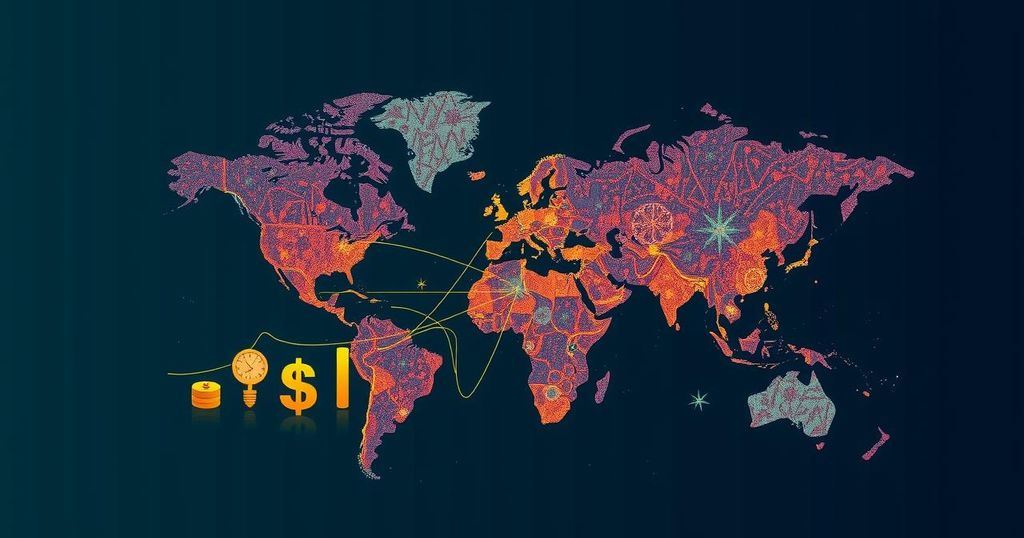Climate change
AF, ANNA, ANNALENA BAERBOCK, ASIA, AV, AVINASH PERSAUD, AZERBAIJAN, BAKU, CLIMATE CHANGE, CLIMATE JUSTICE, DONALD TRUMP, ENVIRONMENTAL POLICY, EUROPE, EUROPEAN UNION, GERMANY, GREEN, GREENHOUSE GAS EMISSIONS, HONDURAS, INTER - AMERICAN DEVELOPMENT BANK, LABOUR, NORTH AMERICA, PARIS AGREEMENT, PHILIPPINES, US, WO, WOPKE HOEKSTRA
Isaac Bennett
0 Comments
COP29 Climate Conference Reveals New Dynamics in Global Climate Finance
The COP29 climate conference highlighted a significant pledge of $300 billion annually from wealthy nations by 2035 but revealed dissatisfaction from developing countries over its adequacy. Amidst changing political landscapes and inflation concerns, activists critiqued the vague nature of this commitment, urging for accountability and equitable funding mechanisms. Serious gaps remain in achieving needed financing, as experts advocate for reforms in the financial structure to prioritize climate responsive strategies.
The recent COP29 climate conference highlighted a significant political shift regarding climate finance, with wealthy nations pledging $300 billion annually by 2035 as a response to ongoing global climate challenges. This commitment was met with dissatisfaction from developing countries, which argued that the amount remains insufficient. The backdrop of shifting political landscapes in nations like the United States, Germany, Canada, and Australia has raised concerns about the continuation of robust climate support, particularly with conservative factions gaining traction.
At COP29, Germany and the European Union expressed their intention to lead on climate finance while advocating for a realistic approach to funding for developing nations. European climate commissioner Wopke Hoekstra remarked on the complex geopolitical climate, urging delegates not to be misled by unrealistic expectations. He emphasized that the conference could mark a new era for climate finance, despite prevailing challenges and tensions.
The agreement reached indicates an anticipated requirement of $1.3 trillion annually for climate financing—highlighting a stark $1 trillion gap that remains unaddressed. Activists like Mariana Paoli critiqued the $300 billion pledge as lacking substance, with worries about reliance on loans rather than grants amounting to mere ‘creative accounting’ without clear mechanisms for public funding.
A notable feature of the COP29 agreement allows countries to count climate finance from international institutions, potentially broadening the scope of financial contributions. Multilateral development banks, led by entities such as the World Bank Group, are projected to provide significant climate financing but will also necessitate innovative funding strategies, including taxation initiatives targeting fossil fuel companies.
Finally, experts stress the importance of these financial institutions in maximizing impact through strategic financial deployment. They argue for reforms in the global financial structure to better integrate the needs of developing nations within climate discussions, emphasizing the urgency in shifting the paradigm for climate finance support.
Climate finance has emerged as a pressing issue amid growing environmental challenges exacerbated by climate change, which disproportionately affects poorer nations. The recent COP29 summit showcased the ongoing dialogue between developed and developing countries regarding financial commitments needed to address climate impacts. With historical polluters under increasing pressure, the conversation surrounding climate finance underscores the intersection of political will, economic challenges, and global responsibility, influenced heavily by changing political dynamics in major economies.
The discussions at COP29 reveal that while a commitment of $300 billion by wealthier nations marks progress, it remains insufficient in light of the larger climate finance requirement of $1.3 trillion per year. The geopolitical context complicates the situation, as elections in key countries potentially threaten continued robust climate funding. Activists urge for transparent and substantive climate financing that prioritizes grants over loans, alongside reforms that integrate developing nations’ needs into the global financial agenda. The situation calls for immediate action to ensure that financing commitments translate into meaningful outcomes for those most affected by climate crises.
Original Source: www.france24.com




Post Comment